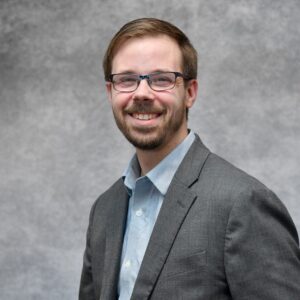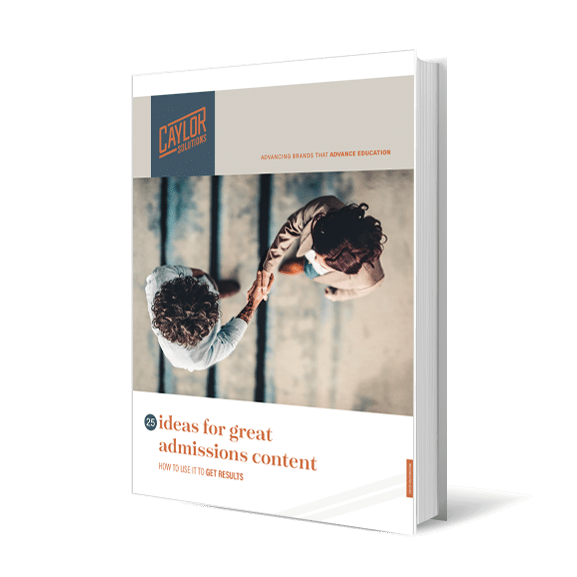Crisis Communication in Higher Ed: Pepperdine’s Wildfire Response
See how Pepperdine University redefined crisis communication in higher ed by prioritizing safety, faith, and storytelling during the California wildfires.
Featured
Improving your student recruitment processes doesn’t mean cramming even more tasks into your day.
In fact, all too often the admissions process can get stuck in an endless loop of application deadlines, essays, and transcripts.
But higher ed marketers can jump off the hamster wheel by investing in “radical hospitality” and focusing on relationship-building with students.
Increasing student recruitment begins by acting intentionally to show students they matter.
What’s more, this is the key to unlocking their true career path.

John knows the marathon of the admissions process and emphasizes pacing yourself because it’s not a sprint.
In this episode, we explore different ways to enhance your student recruitment process.
Radical hospitality goes beyond traditional customer service; it’s about genuinely understanding and addressing the needs of prospective students. John explains.
I was introduced to the concept of radical hospitality a while ago by a colleague of mine who has since moved into a couple different roles.
Radical hospitality is the mindset [and skillset of] really understanding and listening to what the person in front of you is saying.
[Then, it is] providing them the opportunity to get to where they need to be.
If ultimately that means your institution is going to work for them, fantastic! If not, that’s okay.
Because all that’s going to allow you to do is to help the next person. If they say, “No, this isn’t for me” [then you can go on quickly to] help the next person.
This approach requires admissions counselors to step into the role of trusted advisors, focusing on the holistic needs of the student rather than just pushing for immediate enrollment.
One of the key insights from John’s experience is viewing the admissions process as a marathon, not a sprint.
“We need to plan and execute with the mindset of a marathon,” he says. “It’s about setting the groundwork, making informed decisions, and being prepared to adjust as needed.”
This perspective encourages admissions teams to invest time in nurturing relationships, understanding that the ultimate goal is to support students in finding the right fit for their educational journey…
…Even if that means they choose a different institution.
While technology is an essential tool in modern admissions, John cautions against relying too heavily on it at the expense of personal connections.
“CRMs are great, but they’re just tools. They can’t replace the ability to connect on a human level,” he emphasizes.
By using technology to enhance rather than replace human interaction, admissions teams can streamline processes and maintain personal touches that make students feel valued and understood.
To boost student recruitment, higher ed marketers should tailor their marketing messages to address the specific needs and interests of each student.
In order to do this, use CRM data to track interactions and ensure follow-ups are relevant and timely.
John advises that personalized communication should not only leverage CRM data but also incorporate genuine human touches.
We have to make sure that the technology is working for us and not the other way around.
CRMs are great, but they’re a tool. They’re never going to replace the ability for us to connect.
They’re never going to be able to replace the ability for me to pick up a phone and call a prospective student and say to them, “Hey, I know you’re interested in engineering.”
We’ve kind of hit this Nexus point where we’ve leaned almost too much into the technology, and it’s removed some of that [personal touch].
We have to bring it back and go through a process of reestablishing what the core of the profession is.
What is the core of student recruitment?
As I’ve said before, it’s all about building relationships with prospective students in order to help them make the right educational choice for them.
This means using CRM data to inform our communications but still making those personal calls and sending personalized emails that reflect an understanding of the student’s interests and needs.
One idea John shared in the podcast was to build relationships through events.
The “Admission Accomplished” initiative they put on at his institution helps him to keep their student recruitment efforts strong.
The idea of the event is to get students from wherever they are in the admissions funnel to being fully enrolled in about 2 hours!
In this event, students walk in and receive a personalized checklist outlining their current status in the admissions funnel and the steps they need to complete.
The goal is for students to leave the event fully registered for classes or with a clear understanding of the specific steps and appointments required to complete their enrollment.
Sounds crazy? Well, it’s working!
The event has become a major tentpole program at the institution, with 211 people having participated in the event by the time of the podcast recording with about 72% leaving enrolled.
It seems that the event taps into the students’ craving for in-person experiences, as evidenced by high attendance at other on-campus events like open houses.
Another key to boosting student recruitment is to continuously assess and refine your admissions strategies.
John’s team regularly reviews their processes, making adjustments based on feedback and results to improve efficiency and effectiveness.
When they notice that certain events or communication methods are not yielding the desired results, they don’t just abandon them.
Instead, they adjust their approach based on the feedback received and the data collected.
This might mean tweaking the format of an event, changing the timing of communications, or trying new engagement techniques.
The key is to remain flexible and responsive to both successes and shortcomings.
Yet another way to build relationships with prospective students is to offer comprehensive support services that address both academic and personal needs.
This includes mental health resources, financial advising, and career counseling, ensuring students feel supported throughout their educational journey.
John emphasizes the importance of mental health services in today’s educational environment, noting that…
The future arms race in higher education is not the lazy river it was ten years ago.
It is mental health counseling supported by student support services. That’s where our industry is going.
We’re going to have to make sure that we are wrapping our arms all the way around the student holistically. And that starts at the [beginning of the relationship].
By providing a robust support system, institutions can help students overcome various challenges and stay focused on their academic goals.
Finally, higher ed marketers should be honest with students about what their institution can offer.
If another school is a better fit, guide them accordingly.
This builds trust and can lead to referrals from satisfied families, as John experienced. In the podcast, he shared a story about advising a student and their family on a more affordable and suitable alternative institution.
Although this led to the student withdrawing their application, the family was so appreciative of the honesty and support that they referred several other students to John.
As John said, “It’s about being relational and hearing what someone’s saying..”
It is all about understanding if your institution is the best fit for the prospective student or if maybe a different path is right for them.
John’s approach to admissions focuses on long-term success rather than short-term gains.
By building strong, trust-based relationships, institutions can improve retention and satisfaction rates, ultimately leading to better outcomes for both students and schools.
The conversation with John McGreal provides valuable insights for higher education marketers looking to transform their admissions processes.
By embracing radical hospitality and viewing admissions as a marathon, institutions can boost their student recruitment by creating a more supportive, engaging, and effective environment for prospective students.
Listen to our full interview with John McGreal to get even more insights into:
Contact us today and inquire about our enrollment assessment service!
In short, with this service, you’ll get a detailed evaluation of your institution’s existing enrollment processes and strategies, pinpointing inefficiencies and areas for improvement.
It’s a great first step to stop spinning your wheels and finally getting the traction you need in student recruitment!
You’re in luck! We’ve curated 25 awesome ideas inspired by top higher ed institutions across the country and put them in one handy guide: 25 Ideas for Great Admissions Content. 
Get inspired.
Get enrollment results.
Get 25 Ideas for Great Admissions Content.
Download your copy today!
Featured image via wctc.edu
Subscribe to The Higher Ed Marketer podcast today!